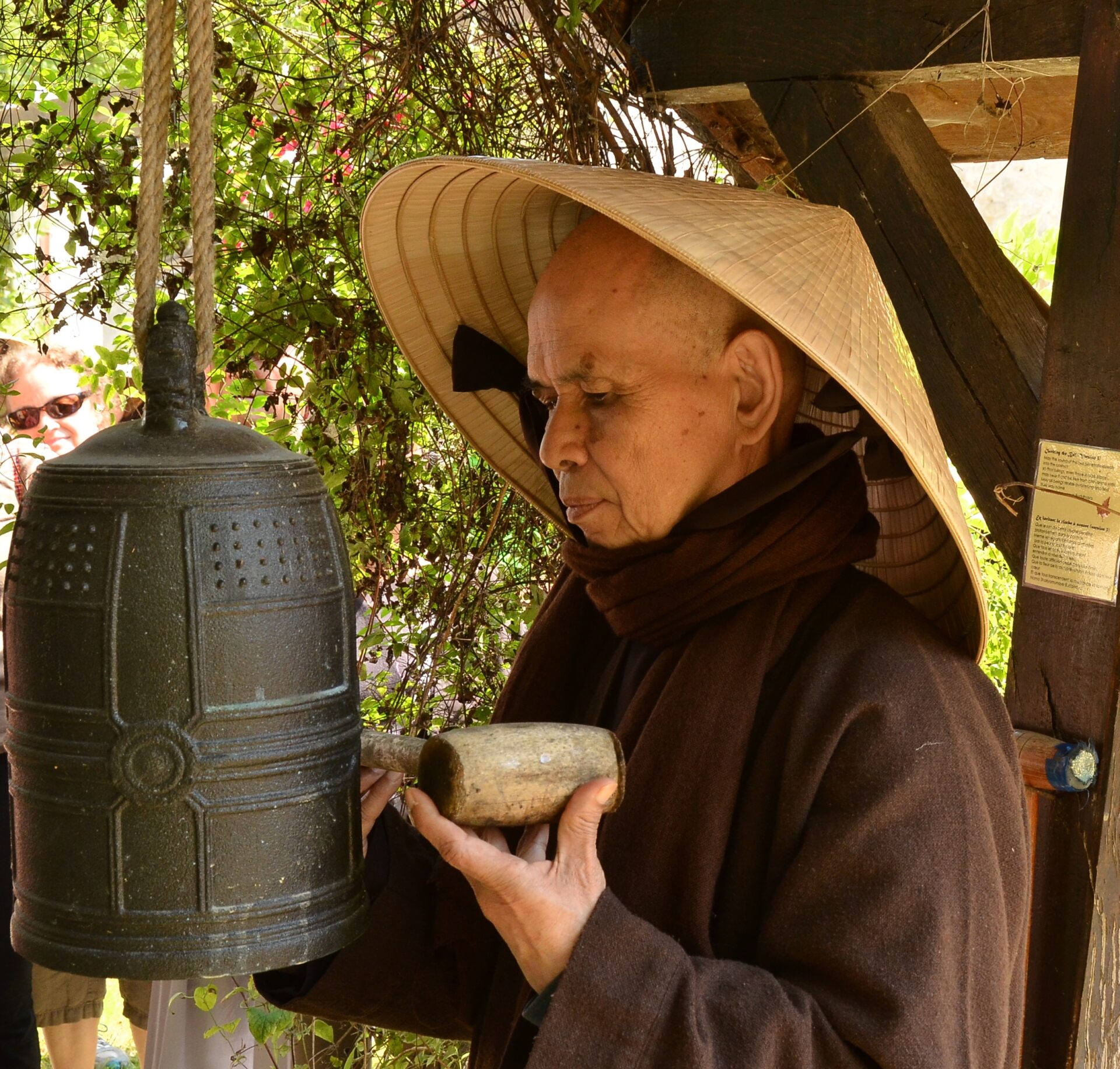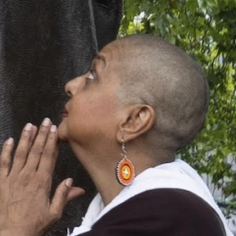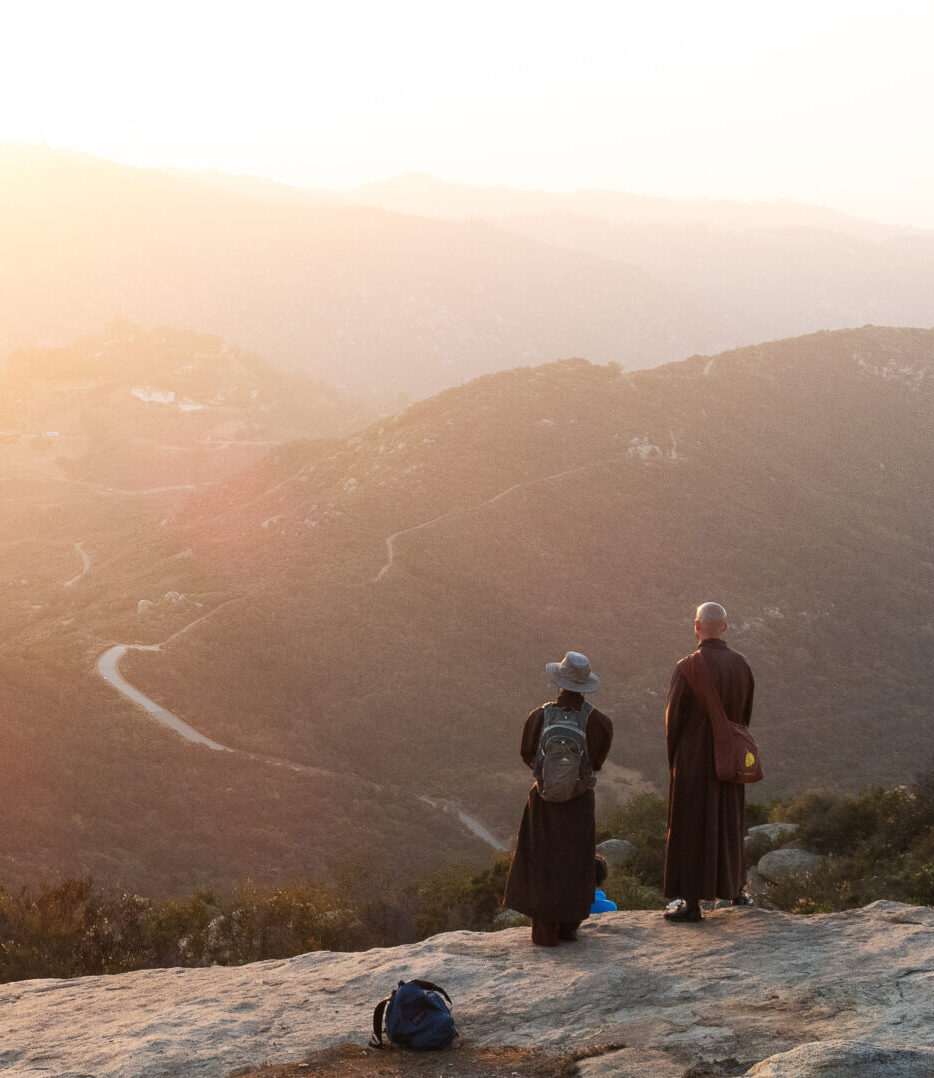Order of Interbeing member rehena Harilall explores the enduring relevance of Thầy’s wisdom as we face complex issues such as war, climate change, and systemic injustice.
By rehena Harilall on
In the 1980s, amidst apartheid’s brutal grip in South Africa, I first heard of Thích Nhất Hạnh. A story reached me about a Zen monastery where time itself paused with each ring of a temple bell that invited monks and visitors to return to their breath.
Order of Interbeing member rehena Harilall explores the enduring relevance of Thầy’s wisdom as we face complex issues such as war, climate change, and systemic injustice.
By rehena Harilall on
In the 1980s, amidst apartheid’s brutal grip in South Africa, I first heard of Thích Nhất Hạnh. A story reached me about a Zen monastery where time itself paused with each ring of a temple bell that invited monks and visitors to return to their breath. At the time, I dismissed these teachings as irrelevant to our struggle. How could mindfulness address the harsh reality of institutional racism, violence, and oppression? What role could meditation play in a land where people were fighting for their fundamental rights?
Yet the story of the temple bell lingered, whispering possibilities I wasn’t ready to hear. Years later, this simple practice—this pause, this return to breath—would reveal itself as a profound tool for transformation, though first I would bear witness to apartheid’s devastation for many years. During those years, activism, exhaustion, and the painful realization that our struggle had left wounds deeper than the visible scars of apartheid marked my life. Each act of resistance added another layer to the armor I had built around my heart until, eventually, the weight of this armor became impossible to bear.
Thầy’s writings became a gateway to understanding how mindfulness could address the complex layers of trauma, grief, and anger I carried.

In the late 1990s, seeking ways to process the emotional wounds apartheid had etched into my being, I came to the UK to begin practicing mindfulness seriously. At first, it was just breathing—simple mindful breaths that helped calm the storm of memories and rage. Then came walking meditation, each step a conscious choice to stay present rather than flee into the past or future. Thầy’s writings became a gateway to understanding how mindfulness could address the complex layers of trauma, grief, and anger I carried.
During the Vietnam War, Thầy exemplified how spiritual practice could foster resilience and love amid devastation. He responded not with bitterness but with profound acts of engaged action: he rebuilt villages, established schools, nurtured orphans, and spoke against harm, all of which eventually resulted in his exile. Through Thầy’s example, I learned that mindfulness wasn’t an escape from suffering but a courageous turning toward it—one that extends beyond the meditation cushion into concrete action rooted in the ethics of non-harming, compassion, and loving speech while engaging for justice and social change.
Through Thầy’s example, I learned that mindfulness wasn’t an escape from suffering but a courageous turning toward it—one that extends beyond the meditation cushion into concrete action rooted in the ethics of non-harming, compassion, and loving speech while engaging for justice and social change.
Thầy’s wisdom showed me how to engage with the world’s suffering without drowning in it and transformed my social justice work from a reaction born of anger into action rooted in love. Joining the Order of Interbeing marked a complete reorientation of my life—a commitment to cultivating a peace within that could create ripples of transformation in the wider world.
At my first retreat, Thầy’s presence revealed the depth of his teaching—not only with words, but also through simple, mindful presence. One morning, arriving early for meditation, I sat near the front of the hall. As dawn crept in through the windows, I felt, rather than saw, someone settle beside me. The silence deepened, as though the space itself had begun to meditate.
When I opened my eyes, I glimpsed Thầy’s back retreating. Had he truly sat beside me? Or was it simply the living presence of his teaching, so palpable in that space, that I had felt? The question dissolved into what that moment awakened in me—a commitment to the path I walked.
In 2019, I journeyed to Vietnam, drawn by news of Thầy’s return there after his stroke. On one occasion, a whisper rippled through the temple: “He is here.” In my eagerness, I came into the temple through the wrong entrance and found myself face-to-face with him, his wheelchair paused in the narrow corridor. Startled, I bowed deeply. When I straightened, his gaze met mine with such directness that time seemed to stop. In that suspended moment, I felt simultaneously exposed and embraced. His eyes, deep as still mountain pools, held the entirety of existence. They saw everything—my struggles, my failings, my deepest aspirations—and met it all with boundless compassion. It was a moment of searing clarity that revealed the essence of his teaching: to see deeply is to love deeply is to be fully present.
The final time I saw him alive, Thầy was being wheeled through the temple courtyard, paying respects to his teachers. When his chair paused, he reached out to touch a wooden bench—a gesture so simple yet so complete in its mindfulness that it seemed to consecrate the space. After he left, I approached the bench, drawn by an inexplicable need to connect. I placed my hands where his had rested, as though his touch had left some residue of awakening I might absorb through my skin.
When news of his transition arrived, I was asked to write in his memory, but grief sealed words inside me. Having just mourned Archbishop Desmond Tutu, I found myself suspended in a space beyond expression. Yet, I never truly felt Thầy’s absence—his presence had always transcended the physical, and his teachings continue to illuminate the path through our troubled world. My personal encounters with Thầy, particularly that moment in Vietnam, reveal how individual healing can radiate into collective transformation.
Now, in 2025, three years after his passing, I reflect on his wisdom amid today’s global crises. In our yearning for guidance, we often speculate on how Thầy would respond to today’s crises. Yet such thoughts bind his teaching to a fixed time and place, missing the heart of his wisdom and practice. As we witness the anguish in Gaza, Sudan, Ukraine, and countless places torn by greed, craving for power, and trauma and face the existential threat of ecological breakdown and deepening polarization in our communities, Thầy’s words echo with renewed urgency. His enduring legacy invites us to engage fully with what is happening in this moment through the ethical application of our practice. “Peace is every step.”
For me, Thầy lives on in the whisper of wind answering my desperate calls for support amid strong emotions, in the fragrance of yellow chrysanthemums on my altar, in the resonant voice of the meditation bell calling us home to the present moment. Sometimes, I catch glimpses of his brown robe—not in physical reality, but in the way someone walks with gentle awareness, their feet kissing the earth, their hands and words reaching out to heal our wounded world.
Thầy’s life and teachings offer a timeless guide, reminding us that real transformation begins within, with every mindful breath and step, yet must extend outward to heal our communities and protect all forms of life. In honoring Thầy’s legacy, may we embody these teachings through engaged action, advocacy for justice, and protection of our planet—each step guided by the wisdom he so deeply lived.
Gate Gate Pāragate Pārasaṃgate Bodhi Svāhā.
Author’s Notes:
1. Thích Nhất Hạnh affectionately called Thầy, meaning “teacher” in Vietnamese
2. The closing Sanskrit phrase, from the Heart Sutra, has been translated by Thích Nhất Hạnh as “Gone, gone, gone all the way over, everyone gone to the other shore. Enlightenment!”


